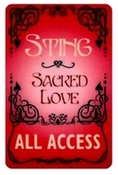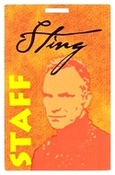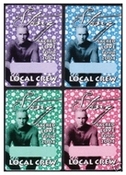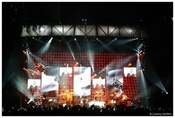
Sacred Love
Sep
25
2004
Phoenix, AZ, US
Cricket Pavilionwith Dominic Miller & Annie Lennox
1
Lennox & Sting prove they've still got it...
Sting may have top billing on his tour with Annie Lennox, but he had his hands full in trying to top her opening set Saturday night in Phoenix.
Both artists have built solid careers after leaving their '80s bands - Sting's Police and Lennox's Eurythmics - but Lennox seems to be the hungrier of the two onstage.
Those who arrived fashionably late at Cricket Pavilion sold themselves short because Lennox's 70-minute performance was brilliant, showcasing a voice with as much range and complexity as any woman in pop music.
From her ultra-sleek show opener, 1992's 'Legend In My Living Room' to her dreamy, set-closing take on Why (also from her first solo album) Lennox exuded an abundance of energy and soul.
She also seems to be turning back the clock as she nears 50, looking fabulous, in hip-hugging jeans and a sparkling top, her light hair cropped short.
It didn't take long for latecomers to start rushing to their seats as Lennox and her tight, five-piece band moved into the driving, funky 'Little Bird' and the singer began pushing her vocals over the top in 'Pavement Cracks', a hit on the dance charts in 2003.
Lennox's vocals also soared in 'Waiting In Vain' and in a fun version of 'Walking On Broken Glass', which found Lennox shuffling around the stage with a sly grin.
She moved behind a baby grand piano to transform the Eurythmics' 'Here Comes The Rain Again' into a romantic, sweeping experience.
Romance turned to lust as Lennox performed a gritty version of another Eurythmics' tune, 'I Need a Man', dropping visual innuendo by straddling the microphone stand early on.
By the time she started winding down her hourlong set with 'Sweet Dreams', Lennox had concertgoers looking at each other and nodding their heads in approval.
Sting, on the other hand, simply needed to stroll out onstage, in a suitcoat and dark slacks, to earn screams of approval from females mostly age 30 and older.
By the time Sting launched his set with the world beat of 'Send Your Love', at least 15,000 people had arrived on Cricket's grounds.
Despite his respected solo catalog, Sting, 52, quickly threw off his suit coat and moved to hits from the Police. 'Synchronicity II' was slightly ragged and mechanical, but 'Every Little Thing' warmed up the crowd, which sang along loudly in places.
Early on, Sting's voice sounded a bit tired or congested, as if he was fighting off a cold.
However, that didn't stop him from some lighthearted banter about the venue of the evening's name, comparing it to the English sport: ''Cricket is like baseball crossed with 'Jeopardy.' Nobody knows what the (expletive) they're doing.''
His voice started gaining strength as he accompanied himself on acoustic guitar for 'Dead Man's Rope', from his latest album, 'Sacred Love'. Some alluring video of trees, a night sky and shooting stars added to the mood.
The singer and his five-piece band skillfully blended reggae with jazz in his early solo hit, 'Englishman In New York', while Sting's poetry was wrapped in jazzy piano during 2003's 'Never Coming Home'.
With a pair of percussionists, two players on piano and synthesizer, two backup singers and talented guitarist Dominic Miller - who opened the show with a short, well-received set - Sting had no trouble finding his groove and keeping many audience members dancing much of the night.
Singer Joy Rose brought the house down as she briefly overpowered Sting's vocals, wailing her way through 'Whenever I Say Your Name', also from 'Sacred Love'. Sting showed off his bass-playing skills on another new song filled with clever verse, 'Never Coming Home'.
Sting sampled plenty of highlights from his career, although he stretched the Police mega-hit 'Roxanne' too far, even dropping in some phrasing from another Police chestnut, 'King of Pain'. This is what happens when you play a song 10,000 times.
But when he invited Lennox out for a soulful duet on 'We'll Be Together', she seemed to be pushing things just a little harder.
Sting's 100-minute set left the audience happy, but Lennox's opening performance left many concertgoers amazed.
(c) The Arizona Republic by David Lukens
Sting may have top billing on his tour with Annie Lennox, but he had his hands full in trying to top her opening set Saturday night in Phoenix.
Both artists have built solid careers after leaving their '80s bands - Sting's Police and Lennox's Eurythmics - but Lennox seems to be the hungrier of the two onstage.
Those who arrived fashionably late at Cricket Pavilion sold themselves short because Lennox's 70-minute performance was brilliant, showcasing a voice with as much range and complexity as any woman in pop music.
From her ultra-sleek show opener, 1992's 'Legend In My Living Room' to her dreamy, set-closing take on Why (also from her first solo album) Lennox exuded an abundance of energy and soul.
She also seems to be turning back the clock as she nears 50, looking fabulous, in hip-hugging jeans and a sparkling top, her light hair cropped short.
It didn't take long for latecomers to start rushing to their seats as Lennox and her tight, five-piece band moved into the driving, funky 'Little Bird' and the singer began pushing her vocals over the top in 'Pavement Cracks', a hit on the dance charts in 2003.
Lennox's vocals also soared in 'Waiting In Vain' and in a fun version of 'Walking On Broken Glass', which found Lennox shuffling around the stage with a sly grin.
She moved behind a baby grand piano to transform the Eurythmics' 'Here Comes The Rain Again' into a romantic, sweeping experience.
Romance turned to lust as Lennox performed a gritty version of another Eurythmics' tune, 'I Need a Man', dropping visual innuendo by straddling the microphone stand early on.
By the time she started winding down her hourlong set with 'Sweet Dreams', Lennox had concertgoers looking at each other and nodding their heads in approval.
Sting, on the other hand, simply needed to stroll out onstage, in a suitcoat and dark slacks, to earn screams of approval from females mostly age 30 and older.
By the time Sting launched his set with the world beat of 'Send Your Love', at least 15,000 people had arrived on Cricket's grounds.
Despite his respected solo catalog, Sting, 52, quickly threw off his suit coat and moved to hits from the Police. 'Synchronicity II' was slightly ragged and mechanical, but 'Every Little Thing' warmed up the crowd, which sang along loudly in places.
Early on, Sting's voice sounded a bit tired or congested, as if he was fighting off a cold.
However, that didn't stop him from some lighthearted banter about the venue of the evening's name, comparing it to the English sport: ''Cricket is like baseball crossed with 'Jeopardy.' Nobody knows what the (expletive) they're doing.''
His voice started gaining strength as he accompanied himself on acoustic guitar for 'Dead Man's Rope', from his latest album, 'Sacred Love'. Some alluring video of trees, a night sky and shooting stars added to the mood.
The singer and his five-piece band skillfully blended reggae with jazz in his early solo hit, 'Englishman In New York', while Sting's poetry was wrapped in jazzy piano during 2003's 'Never Coming Home'.
With a pair of percussionists, two players on piano and synthesizer, two backup singers and talented guitarist Dominic Miller - who opened the show with a short, well-received set - Sting had no trouble finding his groove and keeping many audience members dancing much of the night.
Singer Joy Rose brought the house down as she briefly overpowered Sting's vocals, wailing her way through 'Whenever I Say Your Name', also from 'Sacred Love'. Sting showed off his bass-playing skills on another new song filled with clever verse, 'Never Coming Home'.
Sting sampled plenty of highlights from his career, although he stretched the Police mega-hit 'Roxanne' too far, even dropping in some phrasing from another Police chestnut, 'King of Pain'. This is what happens when you play a song 10,000 times.
But when he invited Lennox out for a soulful duet on 'We'll Be Together', she seemed to be pushing things just a little harder.
Sting's 100-minute set left the audience happy, but Lennox's opening performance left many concertgoers amazed.
(c) The Arizona Republic by David Lukens
September 25, 2004
SET LIST
- Send Your Love
- Synchronicity II
- Every Little Thing She Does Is Magic
- Dead Man's Rope
- We'll Be Together (with Annie Lennox)
- Seven Days
- Fragile
- Fields Of Gold
- Sacred Love
- Englishman In New York
- Whenever I Say Your Name
- Never Coming Home
- Roxanne
- Desert Rose
- If I Ever Lose My Faith In You
- Every Breath You Take
- A Thousand Years








